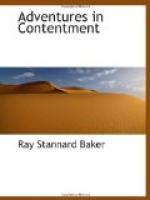In the district school that I attended when a boy we used to love to leave our mark, as we called it, wherever our rovings led us. It was a bit of boyish mysticism, unaccountable now that we have grown older and wiser (perhaps); but it had its meaning. It was an instinctive outreaching of the young soul to perpetuate the knowledge of its existence upon this forgetful earth. My mark, I remember, was a notch and a cross. With what secret fond diligence I carved it in the gray bark of beech trees, on fence posts, or on barn doors, and once, I remember, on the roof-ridge of our home, and once, with high imaginings of how long it would remain, I spent hours chiseling it deep in a hard-headed old boulder in the pasture, where, if man has been as kind as Nature, it remains to this day. If you should chance to see it you would not know of the boy who carved it there.
So Doctor North left his secret mark upon the neighbourhood—as all of us do, for good or for ill, upon our neighbourhoods, in accordance with the strength of that character which abides within us. For a long time I did not know that it was he, though it was not difficult to see that some strong good man had often passed this way. I saw the mystic sign of him deep-lettered in the hearthstone of a home; I heard it speaking bravely from the weak lips of a friend; it is carved in the plastic heart of many a boy. No, I do not doubt the immortalities of the soul; in this community, which I have come to love so much, dwells more than one of John North’s immortalities—and will continue to dwell. I, too, live more deeply because John North was here.
He was in no outward way an extraordinary man, nor was his life eventful. He was born in this neighbourhood: I saw him lying quite still this morning in the same sunny room of the same house where he first saw the light of day. Here among these common hills he grew up, and save for the few years he spent at school or in the army, he lived here all his life long. In old neighbourhoods and especially farm neighbourhoods people come to know one another—not clothes knowledge, or money knowledge—but that sort of knowledge which reaches down into the hidden springs of human character. A country community may be deceived by a stranger, too easily deceived, but not by one of its own people. For it is not a studied knowledge; it resembles that slow geologic uncovering before which not even the deep buried bones of the prehistoric saurian remain finally hidden.




